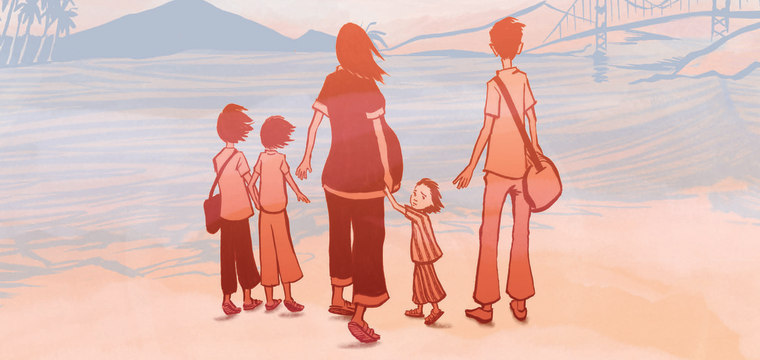Before she began to work on her graphic novel in 2007, Thi Bui had never drawn a comic in her life. Now, 10 years later, she'll debut her family's story through an illustrated memoir already being praised by literary heavyweights, such as Maxine Hong Kingston and Viet Thanh Nguyen.
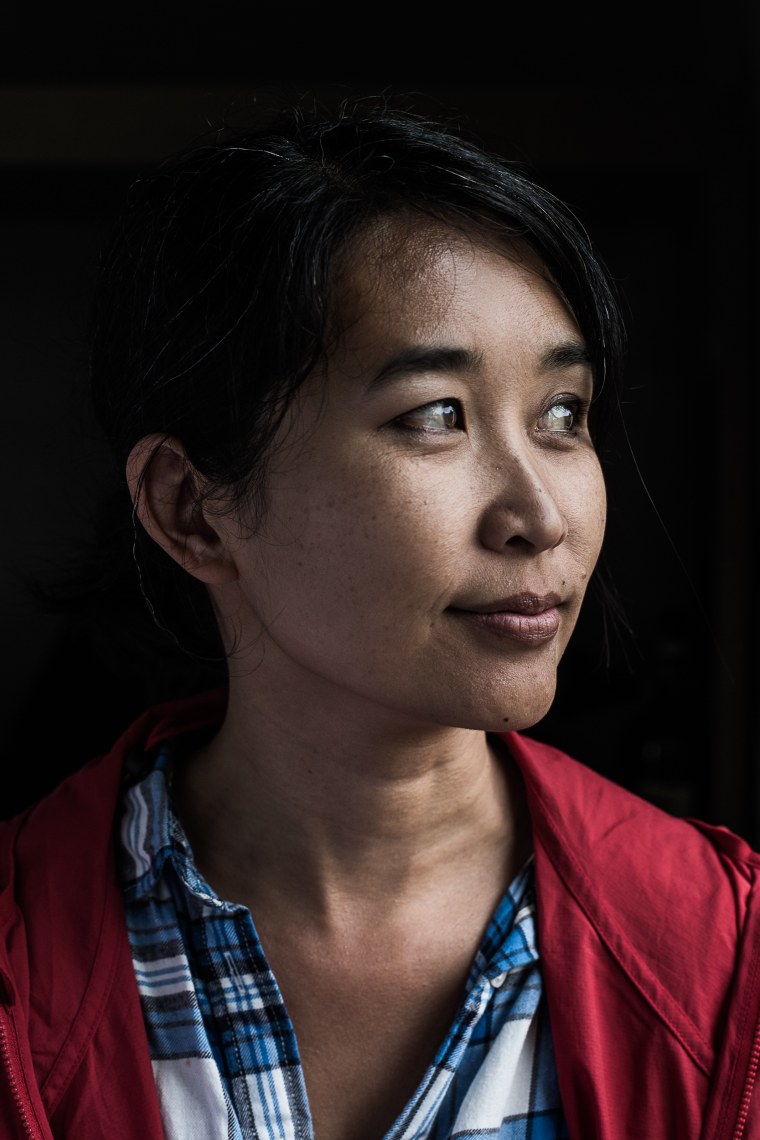
"The Best We Could Do," scheduled to be released in March, centers around Bui and her family’s immigration to the United States during the Vietnam War. Through narration that alternates between the present — in which Bui is pregnant with her son — and the past, she illustrates the rippling effects displacement and war have throughout generations. At the core of the story, Bui illustrates the evolving relationships between parents and children and, after having her son, discovering what it really means to be a mother.
Bui spoke to NBC News about the challenges of writing about family, the benefits of publishing her first novel later in life, and how readers can help empower immigrant voices within art and literature.
How did “The Best We Could Do” originally begin? And through the 10 years you worked on this, what kept you going?
It started with the family stories I grew up around. I understood them very much as a kid, but these stories were from another country and my parent’s generation.
By the time I got to grad school, I was really interested in recording them as an oral history. I compiled them for my master’s thesis and tried to present them in a way that had lots of photographs and visuals, but it’s still pretty academic. I felt like I wanted to make it work for a general audience and I was really inspired by some graphic novels I was reading at the time, like “Maus” by Art Spiegelman and “Persepolis” by Marjane Satrapi.
But I hadn’t done comics before so it took me a long time to actually get good enough at comics. I learned to do comics by working on this book, which is a terrible way to learn any new medium. I had to draw a lot of bad pages before making something that felt right.
Then the other thing that changed for me soon after grad school was I became a parent myself. I think that was the major shift that made me feel like all this material I had been sitting on for such a long time, I could actually turn into a story. Suddenly I had so much empathy for my parents because I was finally a parent myself.
After working with your parents for so long on this story, when you finally showed them the final piece, were you nervous?
That would have been really nerve-wracking for sure! But the lucky thing is that my mom lives in my backyard and my dad lives four blocks away.
That sort of happened while I was working on the book and that was also around the time that I realized the book was about parents and children. The name changed from “Refugee Reflex,” which I was never totally happy with, to “The Best We Could Do.”
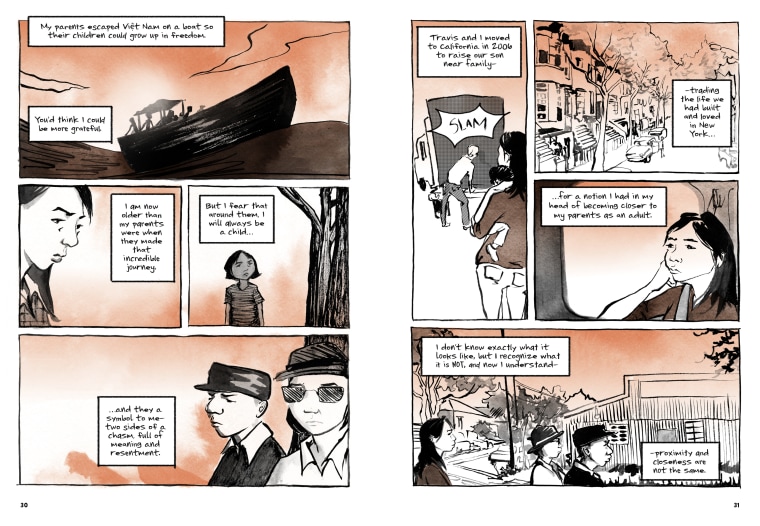
Around this time I was shifting a lot of my life around so I could fit both my aging parents into it. This made it really easy to show them drafts of the book as I was drawing it. They would remember more stuff or they would correct me or realize there was stuff I didn’t know how to draw. We had a lot of back and forth all throughout the book, and I like to think they had veto power the whole time.
Right now with everything happening in politics, the immigrant experience is something that’s on the forefront of a lot of people’s minds. What do you hope your experience and this book inspires in other people?
I wrote it from a place of empathy and trying to understand my parents as human beings rather than as just my parents. I’m hoping that translates to readers. This political discourse around immigration is so divisive, and I’m hoping that this story and where it was made from will remind people just to empathize. They’re human beings just like everybody else and I hope that will cut through and remind people that these are human beings we’re talking about, not “others.”
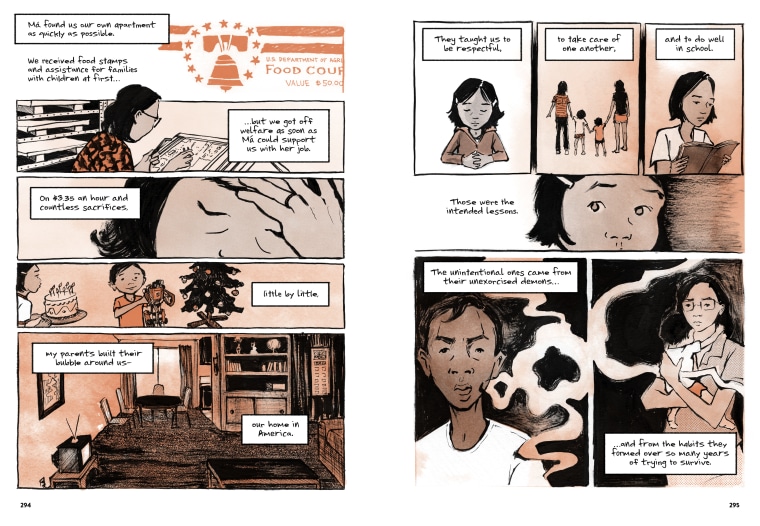
What is your writing and drawing routine like?
I’m all over the place! I would like to say I have a really solid studio practice but I just come up with these things that I want to do and then I plan backwards to see how I can get to them.
I know I have to do a whole book so then I break it down into chapters. Then I try to break the chapters down into stages, and then I go back. I don’t have a really good starting point. It’s all, what do I want to make and what do I need to know in order to make it? Then I teach myself the skills. It’s a little reckless, but it works out, more or less.
What advice would you have for other artists, especially those who might be pursuing art later on in their career and also balancing a full-time job and being a parent?
I don’t think it’s ever too late, and I’m actually enjoying being older as this is happening.
It’s sort of like I get to have a writer life now and before that I had an educator life and a parent life and a "young artist in New York" life. I’ve gotten to have all these different versions of my life, and you have your failures and successes in all of them. But I think now this is helping me feel pretty relaxed about it and that I’ve gotten through the hard part.
In producing a memoir, how do you balance being protective of your family’s story with sharing an honest version of your narrative?
"This political discourse around immigration is so divisive, and I’m hoping that this story, and where it was made from, will remind people just to empathize."
I had to portray them as whole human beings, which meant not showing them as being totally perfect.
I think my mom has a hard time with that because she’s used to you just putting your best self forward. But I think both of my parents see themselves within a bigger picture, and they want Vietnamese stories to be told, so they’re put that priority in front of their own egos. They’ve given me permission to tell the story the way I think the story needs to be told.
At the same time, memoir is funny because you think you’ve revealed everything, but as anyone who’s written a memoir has said, you’ve probably kept as much back as you’ve shown. I haven’t shared everything, but I’ve shared enough to tell the story I wanted to tell.
After reading this book, how can we as readers continue to empower more immigrant voices and Asian-American voices in art and literature?
Find the names that don’t end up on all of the book lists. I’ve noticed that there is a tendency to want to stick with all favorite authors, but I think it might do everybody a greater service to talk about newer authors. This way we keep moving forward instead of bringing in the same ones over and over again.
There are so many new authors that I can’t keep up with all of the books that I buy and I think that I just need to shut myself in for a week so I can actually read everyone’s book all the way through. There is a lot of great work being made so I think it’s just shifting your idea of great books to books about things you don’t know about yet.
What are you going to be working on next?
The next thing I want to really dig into is climate change in Vietnam.
It’s a nonfiction book where I’ll be traveling to Vietnam to do a lot of the primary research, but right now I’m talking to some folks at Cornell who are studying the area where I’m interested — the Mekong Delta. This area grows half the rice for the whole country, and they also export a lot. But it’s only six feet above sea level and the sea is rising every year so by the year 2050 the entire area is going to be underwater. This displaces around a million people.
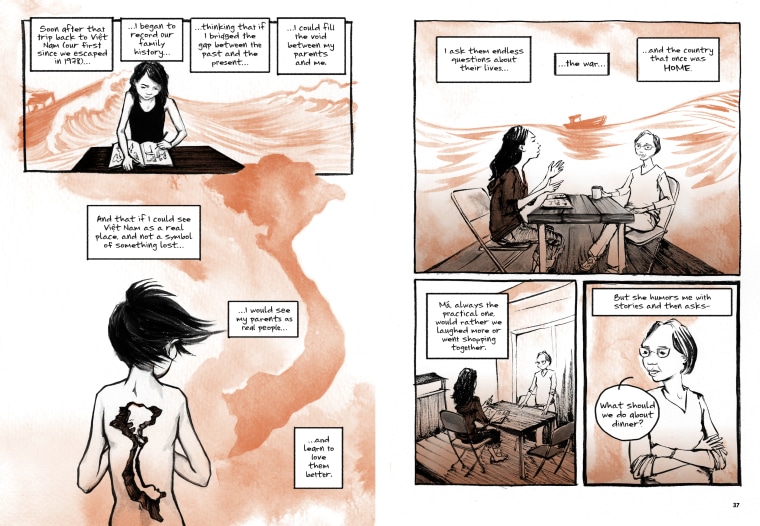
Farmers are already dealing with the salt water coming it and ruining their crops so they have to figure out other ways to make a living — sometimes rice farming and sometimes shrimp farming. I heard some of them have gone out and blown up the sea walls to let the salt water in faster so they can just shrimp farm all year long. It’s like some apocalyptic stuff happening out there.
Here, climate change denial keeps getting deeper and deeper so I just want to go somewhere where there is no climate change denial and people are actually having to deal with it. Also because I’ve been writing about Vietnam’s past for so long, it will be really nice to look at it in the present and think about its future.
This interview has been edited for length and clarity.
Follow NBC Asian America on Facebook, Twitter, Instagram and Tumblr.
